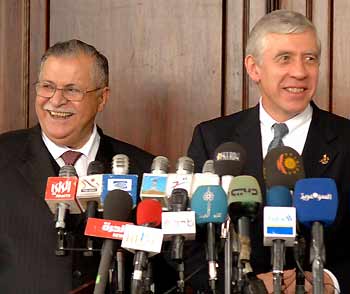|
British withdrawal from Iraq to start within months - Straw
(AFP)
Updated: 2006-01-07 21:15
Visiting Foreign Secretary Jack Straw has said it was hoped Britain's 8,000
troops would start to withdraw from Iraq in a matter of months.
"In practice, what we hope to see is a gradual phased draw-down of British
troops starting, not with Basra, but with one or two of the other provinces in
our area," Straw told AFP.
The phased withdrawal will start "as and when the Iraqis are satisfied that
their own forces can cope completely with the responsibility," he added
following talks with Prime Minister Ibrahim Jaafari and President Jalal
Talabani.

Iraqi President Jalal Talabani (L) and British
Foreign Secretary Jack Straw listen during a news conference at the
fortified Green Zone in Baghdad January 7, 2006.
[Reuters] | "It's going to be a matter of months,"
he added Saturday.
British forces control four of Iraq's southern provinces -- Basra, Nasiriyah,
Samawah and Amara.
"We're here to liberate Iraq. We did not come to colonize it," Straw also
said, noting that "we are here as long as the Iraqi government wants us here."
Speaking of the formation of a new government in Iraq following the December
15 general elections, Straw also insisted that it be as inclusive as possible.
"It's of fundamental importance that they get the formation of this
government right, and that not only means that they declare, as the leaders are
now, that there has to be a government of national unity, but they get the
details right.
"They have got to work out how a broad consensus-based government will work,
how decisions are taken. Because if all that happens is that the cabinet
reflects the divisions that are there in the wider community, then it won't
operate effectively," he said.
Iraq is still awaiting the final results of the election for the first
permanent parliament since Saddam Hussein was ousted by US-led forces in April
2003.
Early results suggest that the Shiite-based religious parties and the Kurdish
alliance will win a majority of the votes, but Sunni Arab and other secular
parties have disputed early results, alleging electoral fraud.
London and Washington are looking to the formation of a stable government of
"national unity" in a bid to undermine Sunni-backed insurgents.
Straw said he would be meeting here Saturday with "representatives of a wide
cross-section of Iraqi society, including leaders who have criticized the
results of the elections", a reference to Sunni Arab parties.
Jaafari told a news conference that the next government would be enlarged to
include "all the major parties" in parliament.
Talabani, for his part, said all sides agreed on the need "to have a
government of national unity" but he acknowledged that "the devil is in the
details."
|